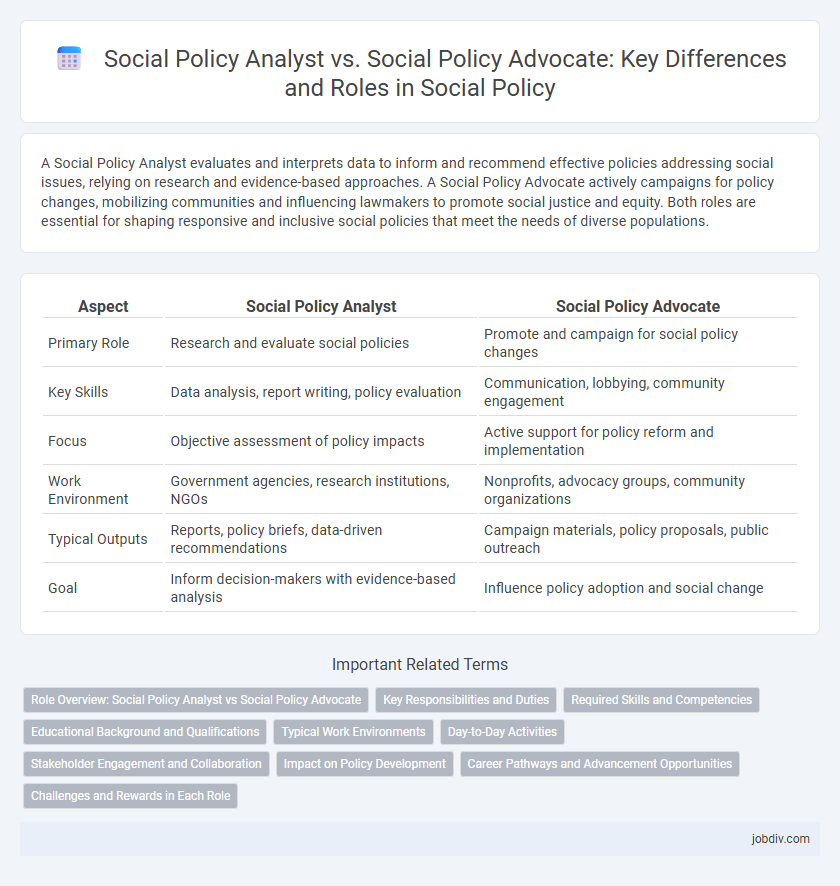A Social Policy Analyst evaluates and interprets data to inform and recommend effective policies addressing social issues, relying on research and evidence-based approaches. A Social Policy Advocate actively campaigns for policy changes, mobilizing communities and influencing lawmakers to promote social justice and equity. Both roles are essential for shaping responsive and inclusive social policies that meet the needs of diverse populations.
Table of Comparison
| Aspect | Social Policy Analyst | Social Policy Advocate |
|---|---|---|
| Primary Role | Research and evaluate social policies | Promote and campaign for social policy changes |
| Key Skills | Data analysis, report writing, policy evaluation | Communication, lobbying, community engagement |
| Focus | Objective assessment of policy impacts | Active support for policy reform and implementation |
| Work Environment | Government agencies, research institutions, NGOs | Nonprofits, advocacy groups, community organizations |
| Typical Outputs | Reports, policy briefs, data-driven recommendations | Campaign materials, policy proposals, public outreach |
| Goal | Inform decision-makers with evidence-based analysis | Influence policy adoption and social change |
Role Overview: Social Policy Analyst vs Social Policy Advocate
Social Policy Analysts conduct in-depth research, evaluate data, and develop evidence-based recommendations to inform policymakers on social issues. Social Policy Advocates engage directly with communities and stakeholders to promote policy changes, raise awareness, and mobilize support for social justice initiatives. Both roles are integral in shaping and advancing effective social policies, with Analysts focusing on data-driven insights and Advocates emphasizing grassroots activism.
Key Responsibilities and Duties
A Social Policy Analyst conducts research and evaluates policies, providing evidence-based recommendations to inform decision-makers and improve social programs. A Social Policy Advocate actively promotes policy changes and mobilizes communities or stakeholders to influence legislation and public opinion. Both roles require a deep understanding of social issues but differ in their approach--analysis versus direct advocacy.
Required Skills and Competencies
Social Policy Analysts require strong analytical skills, proficiency in data interpretation, and expertise in research methodologies to evaluate and develop effective policies. Social Policy Advocates need excellent communication skills, stakeholder engagement abilities, and a deep understanding of policy impact to effectively promote and influence social change. Both roles demand critical thinking, knowledge of social issues, and the ability to collaborate across multidisciplinary teams.
Educational Background and Qualifications
Social Policy Analysts typically hold advanced degrees in public policy, sociology, or social work, emphasizing research methodologies and data analysis to evaluate social programs. Social Policy Advocates often possess backgrounds in social justice, law, or community organizing, with qualifications centered on communication, grassroots mobilization, and policy reform strategies. Both roles require a strong understanding of social welfare systems, but analysts focus on empirical evidence while advocates prioritize stakeholder engagement and policy influence.
Typical Work Environments
Social Policy Analysts typically work in government agencies, research institutions, or think tanks where they analyze data and develop policy recommendations based on empirical evidence. Social Policy Advocates are often found in nonprofit organizations, community groups, or advocacy coalitions where they engage directly with the public and policymakers to promote social change. Both roles require collaboration with stakeholders but differ in their primary focus on research versus active advocacy.
Day-to-Day Activities
Social Policy Analysts conduct in-depth research, analyze data, and evaluate the impact of social policies to provide evidence-based recommendations for policymakers. Social Policy Advocates engage directly with communities, organize campaigns, and lobby legislators to promote policy changes that address social issues. Both roles require strong communication skills but differ in focus: analysts emphasize data-driven insights, while advocates prioritize public engagement and activism.
Stakeholder Engagement and Collaboration
Social Policy Analysts conduct in-depth research and data analysis to inform evidence-based recommendations for policymakers and stakeholders, fostering collaboration through detailed reports and stakeholder consultations. Social Policy Advocates actively engage with community groups, government agencies, and affected populations to mobilize support, influence policy change, and build coalitions for collective action. Both roles require strong communication skills to facilitate meaningful stakeholder engagement and promote inclusive, participatory social policy development.
Impact on Policy Development
Social Policy Analysts evaluate data and research to craft evidence-based recommendations that shape effective policies, driving informed decision-making within government and organizations. In contrast, Social Policy Advocates actively promote these recommendations by engaging stakeholders, lobbying policymakers, and mobilizing public support to accelerate policy adoption. Together, they influence various stages of policy development, with analysts focusing on analysis and formulation while advocates emphasize implementation and advocacy.
Career Pathways and Advancement Opportunities
Social Policy Analysts primarily engage in research, data evaluation, and policy formulation, advancing through roles in academia, government agencies, or think tanks with potential progression to senior analyst or policy director positions. Social Policy Advocates focus on program implementation, community engagement, and lobbying for legislative changes, often moving into leadership roles within nonprofits, advocacy groups, or public sector organizations. Career advancement in both paths depends on expertise in social issues, strategic communication skills, and the ability to influence policy outcomes.
Challenges and Rewards in Each Role
Social Policy Analysts face challenges in data interpretation and balancing conflicting stakeholder interests, yet their role offers rewards in influencing evidence-based decision-making and shaping effective policies. Social Policy Advocates encounter difficulties in mobilizing community support and navigating political resistance, gaining fulfillment from driving social change and amplifying marginalized voices. Both roles contribute uniquely to social progress, demanding resilience, strategic communication, and a deep commitment to equity.
Social Policy Analyst vs Social Policy Advocate Infographic

 jobdiv.com
jobdiv.com